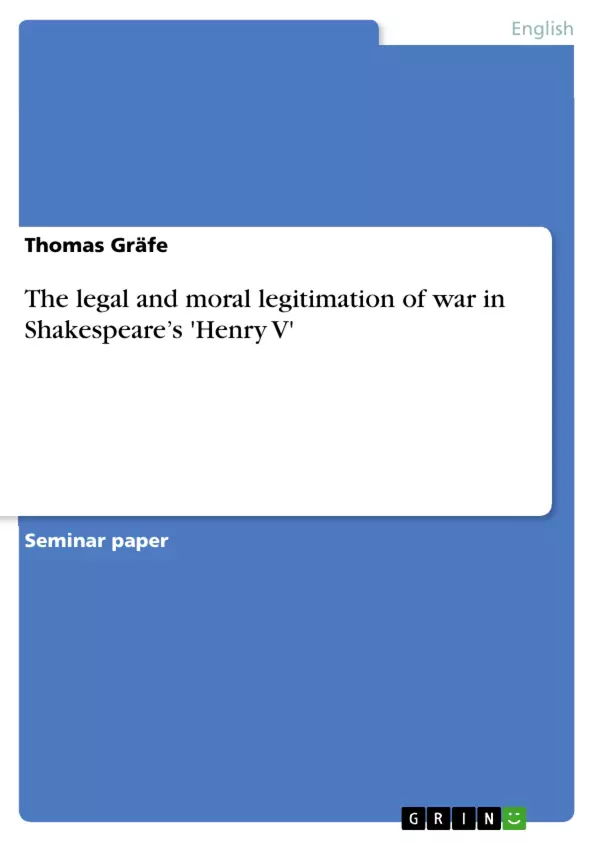Das Referat behandelt die rechtliche und moralische Legitimation des Krieges in Shakespeares History Play Henry V, um damit zu klären, ob es sich um ein "affirmative play" oder ein "problem play" handelt.
Inhaltsverzeichnis (Table of Contents)
- Shakespeare's Henry V: Glorification or criticism of war?
- The legitimation of war
- "jus ad bellum": The medieval concept of the “just war"
- "jus in bello": Chivalric rules of behaviour in war
- Critical aspects in Henry V: The atrocity and futility of war
- Patriotism and national stereotypes
- Conclusion
Zielsetzung und Themenschwerpunkte (Objectives and Key Themes)
This work analyzes the legal and moral legitimation of war in Shakespeare's play *Henry V* by examining the historical context and the play's portrayal of war. The main objective is to determine whether the play glorifies war or presents a critical perspective.
- The concept of "just war" in the Middle Ages
- The use of religious and legal doctrines to justify war
- The role of patriotism and national stereotypes in shaping attitudes towards war
- The ethical and moral implications of warfare
- The ambiguity and hypocrisy of the "just war" doctrine
Zusammenfassung der Kapitel (Chapter Summaries)
- Shakespeare's Henry V: Glorification or criticism of war?: This chapter introduces the two main interpretations of the play – as a glorification of war or as a critical assessment of it. It explores historical context, including the Hundred Years' War and the War of the Roses. The chapter also discusses the play's use as wartime propaganda and its possible connections to contemporary events.
- The legitimation of war: This chapter delves into the medieval concepts of "jus ad bellum" and "jus in bello," which governed the right to go to war and the conduct of war, respectively. It examines how these doctrines were applied in the play to justify Henry's campaign against France.
- "jus ad bellum": The medieval concept of the “just war”: This chapter explores the criteria of "jus ad bellum" in detail, including the need for a just cause, a declaration of war by a legitimate sovereign, the acceptance of the outcome of war as God's decision, and the restoration of peace.
- "jus in bello": Chivalric rules of behaviour in war: This chapter examines the chivalric code of conduct that was expected in war. It highlights the importance of protecting civilians, following royal ordinances, and avoiding atrocities. The chapter also explores the tension between the king's rhetoric and the realities of warfare.
- Critical aspects in Henry V: The atrocity and futility of war: This chapter presents examples from the play that challenge the legitimacy of the "just war" doctrine. It explores the hypocrisy of the Church, the inconsistency between Henry's rhetoric and his actions, and the inherent brutality and futility of war.
Schlüsselwörter (Keywords)
This preview highlights the key themes of the text, including the "just war" doctrine, medieval law and morality, patriotism, national stereotypes, the Hundred Years' War, and the ethical implications of warfare. It also focuses on the critical analysis of the play's portrayal of war and the exploration of the ambiguity and hypocrisy of the "just war" doctrine. Key figures include Henry V, the Archbishop of Canterbury, and other historical figures mentioned in the play.
What is the concept of "jus ad bellum" in Henry V?
It refers to the medieval legal concept of the "just war," which requires a just cause, legitimate authority, and the goal of restoring peace.
How does Shakespeare portray the morality of war?
The play is ambiguous, balancing the glorification of military success with critical depictions of the atrocity, hypocrisy, and futility of warfare.
What are "jus in bello" rules?
These are chivalric rules governing behavior during war, such as protecting civilians and following royal ordinances to avoid unnecessary cruelty.
Is Henry V considered a "problem play"?
Many scholars view it as a problem play because it raises difficult ethical questions about the king's motives and the human cost of his patriotic rhetoric.
What role do national stereotypes play in the play?
Shakespeare uses stereotypes of the English, French, Welsh, and others to explore national identity and the unifying (or dividing) power of war.



